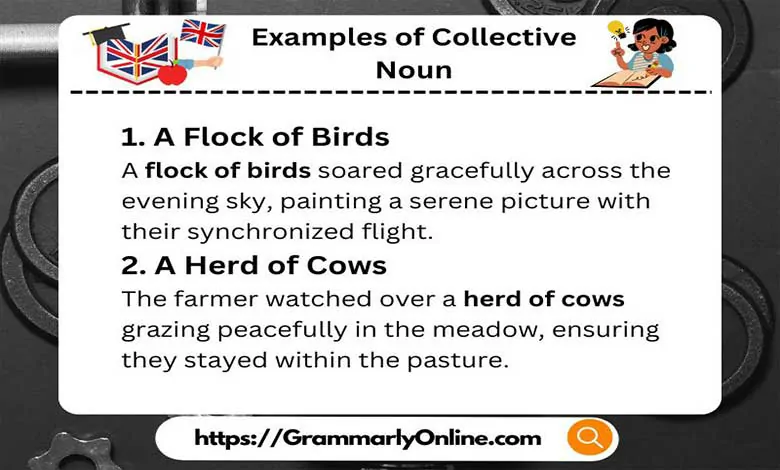20 Examples of Collective Noun In Sentences

Collective nouns, which refer to groups of people, animals, or things, are an essential part of English grammar. They not only add richness to our language but also help us express ourselves more precisely. Below, we explore 20 examples of collective nouns used in sentences to illustrate their importance and application.
What Are Collective Nouns?
Collective nouns are singular nouns that represent a collection or group of individuals, animals, or things. Despite representing multiple entities, they are treated as singular when conjugating verbs. Examples include words like “team,” “flock,” “committee,” and “herd.” Understanding and using collective nouns correctly can enhance both writing and speaking skills.
Examples of Collective Nouns in Sentences
1. A Flock of Birds
A flock of birds soared gracefully across the evening sky, painting a serene picture with their synchronized flight.
2. A Herd of Cows
The farmer watched over a herd of cows grazing peacefully in the meadow, ensuring they stayed within the pasture.
3. A Team of Players
Our local school boasts a team of players who have consistently won the championship for three consecutive years.
4. A Pack of Wolves
In the moonlit forest, a pack of wolves howled in unison, their calls echoing through the trees.
5. A Swarm of Bees
The swarm of bees buzzed around the blooming flowers, diligently collecting nectar to take back to their hive.
6. A Fleet of Ships
The naval commander was proud to lead a fleet of ships on their mission to protect the nation’s waters.
7. A Band of Musicians
At the summer festival, a band of musicians played lively tunes that had the crowd dancing all night long.
8. A Choir of Singers
The church service was elevated by a choir of singers whose harmonious voices filled the sanctuary.
9. A Pod of Dolphins
During our boat trip, we were thrilled to spot a pod of dolphins leaping playfully in the ocean waves.
10. A Bunch of Grapes
She reached for a bunch of grapes at the market, selecting the ripest, most succulent ones for her fruit salad.
11. A Gaggle of Geese
On the lake’s edge, a gaggle of geese honked loudly, their wings flapping as they prepared to take flight.
12. A Crowd of People
A crowd of people gathered in the town square to witness the annual parade, cheering as the floats passed by.
13. A Deck of Cards
After dinner, we settled down for a game with a deck of cards, shuffling and dealing for a fun-filled evening.
14. A Galaxy of Stars
Through the telescope, we marveled at a galaxy of stars twinkling brightly in the vast night sky.
15. A Heap of Trash
The cleanup crew was overwhelmed by a heap of trash left behind after the concert, but they tackled it efficiently.
16. A Troop of Scouts
A troop of scouts set up camp in the forest, learning valuable survival skills and enjoying the great outdoors.
17. A Set of Tools
The carpenter meticulously organized his set of tools, ensuring everything was in its rightful place for the next project.
18. A Regiment of Soldiers
A regiment of soldiers marched in perfect formation, demonstrating their discipline and unity.
19. A Clutch of Eggs
In the bird’s nest, we found a clutch of eggs carefully incubated by the mother bird.
20. A School of Fish
While snorkeling, we swam alongside a school of fish that shimmered like a moving rainbow under the water.
Importance of Using Collective Nouns
Using collective nouns appropriately can significantly improve the clarity and expressiveness of both written and spoken communication. These nouns help paint vivid pictures in the minds of listeners and readers, making descriptions more dynamic and engaging. They are also crucial in academic and professional settings, where precise language is necessary.
Common Mistakes with Collective Nouns
One common mistake with collective nouns is confusing singular and plural verb agreements. Remember, collective nouns usually take singular verbs, even though they refer to multiple entities. For example, we say, “The team is winning,” not “The team are winning.” Another mistake is using a collective noun incorrectly, such as saying “a bunch of cows” instead of “a herd of cows.” Familiarizing oneself with the correct collective nouns for specific groups is essential for proper usage.
Conclusion
Collective nouns are a fascinating and vital part of the English language. They bring specificity and imagery to our expressions, making our communication richer and more precise. By understanding and using collective nouns correctly, we can enhance our language skills and convey our thoughts more effectively.

